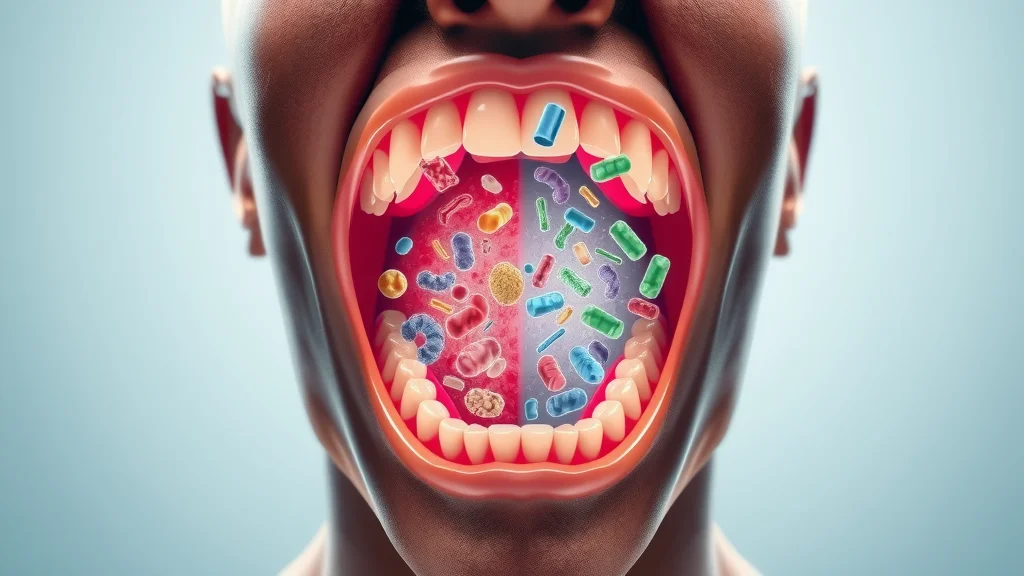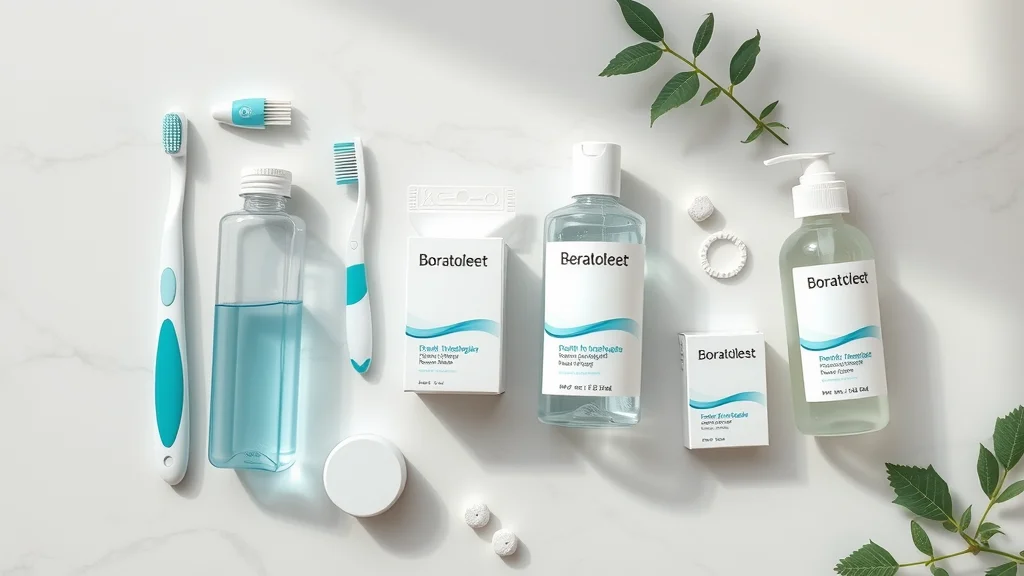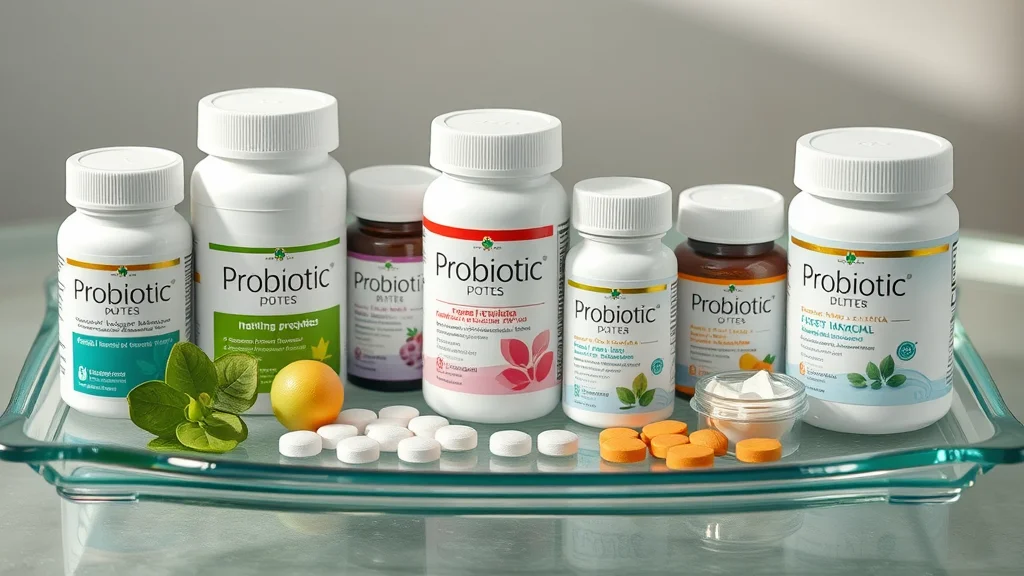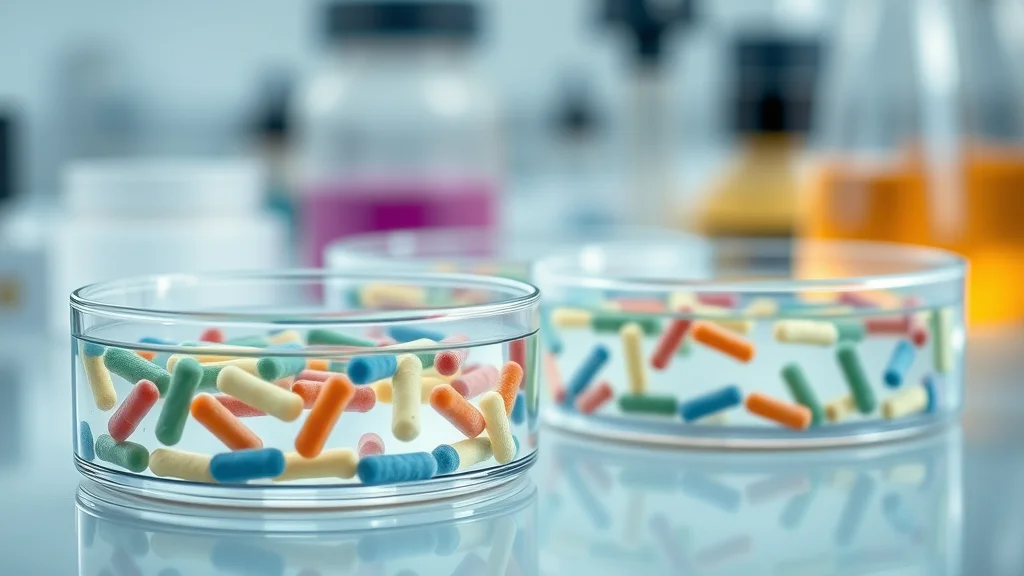"Good health starts in the mouth," said Hippocrates, underscoring why probiotics for oral health are gaining attention as natural allies against bad breath and cavities. Discover how these beneficial bacteria can transform your oral hygiene routine and protect your smile.

"Good health starts in the mouth": Why Probiotics for Oral Health Matter More Than Ever
"Good health starts in the mouth," said Hippocrates, underscoring why probiotics for oral health are gaining attention as natural allies against bad breath and cavities.
It's easy to overlook, but your oral cavity is the gateway to your entire body—it’s also home to a thriving community of bacteria. While standard dental routines like brushing and flossing are foundational, probiotics for oral health are quickly gaining recognition for their powerful ability to support a healthy balance within the mouth. Whether you’re fighting persistent bad breath, worried about gum disease, or simply want to enhance your overall oral health, oral probiotics offer a unique, science-backed solution.
These living microorganisms work by crowding out bad bacteria, promoting good bacteria, and supporting your mouth’s ecosystem in a way toothpaste and mouthwash alone just can’t match. As more research reveals the intricate relationship between the oral microbiome and broader systemic health—including the gut and immune system—it’s clear: what happens in the mouth doesn’t stay in the mouth. Integrating oral probiotics into your daily routine could be the game-changer your dental health needs, offering a smarter, natural approach to preventing tooth decay, dental caries, and even serious oral diseases.
As you explore the benefits of oral probiotics, it's also worth considering how different supplement forms can impact your health goals. For example, understanding the pros and cons of gummy supplements versus traditional tablets can help you make more informed choices about your daily wellness routine. If you're curious about how supplement delivery methods affect effectiveness, this guide to gummy supplements’ effectiveness offers a practical comparison.
What You’ll Learn About Probiotics for Oral Health
How probiotics for oral health work to balance bacteria in your mouth
The science behind probiotics’ role in fighting bad breath and gum disease
Benefits of dental probiotic versus traditional oral care
Choosing the right oral probiotic for your needs
Expert tips and everyday habits for maintaining oral health naturally
Oral Health Basics: How Your Oral Cavity Sets the Stage

Understanding the Microbiome: Oral Cavity vs. Gut Health
The oral cavity is not just a pathway for food and speech; it’s also an ecosystem teeming with hundreds of bacterial species. Like the gut, the mouth hosts a unique microbiome—an intricate mix of good bacteria and bad bacteria—that plays a crucial role in maintaining oral and overall health. While the gut health discussion has gone mainstream, recent scientific insights show the oral microbiome is just as influential. The difference? The mouth’s microbiome is constantly exposed to new bacteria from food, drink, and the environment, making its balance particularly delicate.
Unlike the gut, the oral cavity requires a constant, dynamic balance to fend off threats like tooth decay, gingivitis, and periodontal disease. When the oral microbiome is healthy, beneficial bacteria help regulate the local environment, keep harmful microbes in check, and maintain a favorable pH. However, lifestyle factors (like smoking, sugar intake, and insufficient cleaning) often tilt the balance toward harmful bacteria, driving the risk of cavities and gum disease. This is where oral probiotics step in—acting as reinforcements to the mouth’s natural defenses, supporting both oral health and the body’s first line of immune protection.
Why Bad Breath and Gum Disease Are More Than Just Annoyances

While bad breath—or halitosis—can be socially awkward, and gum disease can seem like a minor irritation, both are signals of a deeper problem within your oral microbiome. These conditions often result from an overgrowth of bad bacteria that produce smelly sulfur compounds and create an inflammatory environment. Far beyond being a simple inconvenience, research indicates that prolonged oral diseases can have ripple effects throughout the body, increasing the risk of heart disease, diabetes, and even pregnancy complications.
Persistent bad breath and gum disease reflect an unhealthy balance of bacteria that can damage oral tissue, create biofilms where microbes hide from standard cleaning, and pave the way for costly interventions like fillings or periodontal treatments. By addressing these foundational issues at the microbiome level—with the help of oral probiotics—you can support not only a fresher smile but also whole-body well-being. Think of probiotics for oral health as your microscopic partners in neutralizing odor, sustaining gum resilience, and guarding against systemic repercussions.
The Science: How Probiotics for Oral Health Combat Cavities and Bad Breath
Mechanisms of Probiotic Action in the Oral Cavity
Suppressing bad bacteria
Encouraging beneficial strains
Balancing pH and preventing plaque build-up

The secret behind probiotics for oral health lies in their ingenious mechanisms of probiotic action. When you introduce oral probiotic strains into your mouth—via lozenges, tablets, or dietary sources—you’re sending in reinforcements that can directly outcompete and suppress harmful bacteria. These probiotic bacteria adhere to teeth and gum surfaces, making it harder for bad bacteria (like Streptococcus mutans, linked to dental caries) to stick around and form plaque.
What’s more, certain probiotics such as Lactobacillus reuteri and Streptococcus salivarius are shown to stabilize the oral environment by lowering acid levels, resisting pH swings after meals, and encouraging a thriving community of good bacteria. By balancing oral pH and inhibiting the growth of biofilm-forming microbes, they offer dual-action protection against both bad breath and cavities. These mechanisms work not just in a Petri dish but have also shown statistically significant improvements in human studies, making oral probiotics a science-based solution worth your attention.
Key Effects of Probiotic Bacteria in Dental Health
"Research shows certain oral probiotics reduce bad breath and lower cavity risk by crowding out harmful bacteria." — Dr. Lisa Cheng, DDS
The most notable effects of probiotic bacteria for dental health go beyond simple microbe management. Clinical research highlights how the right probiotic strains—like Lactobacilli and Bifidobacteria—can actively inhibit the growth of odor-causing and cavity-forming microbes, boosting your oral environment’s resilience. By reinforcing the community of beneficial bacteria, these supplements contribute to stronger gums, a reduction in visible dental plaque, and fresher breath—all critical in reducing the need for aggressive treatments down the line.
What’s more, individuals using dental probiotic supplements showed more durable results compared to a control group solely relying on traditional care. Because probiotics strengthen your body’s natural ability to heal tissues and stabilize the oral microbiota, their benefits extend to managing periodontal disease and other chronic conditions. Think of oral probiotics as naturally harnessing the bacteria your body already knows how to work with—resulting in real, measurable health benefits that last.
Oral Probiotic vs. Dental Probiotic vs. Traditional Care
Comparing Approaches to Oral Health |
|||
Method |
Main Benefits |
How It Works |
Best Use Case |
|---|---|---|---|
Oral Probiotic |
Restores healthy balance of oral microbiota, reduces bad breath, supports gum health |
Delivers beneficial microbes that outcompete bad bacteria and stabilize pH |
Prevention and ongoing support for overall oral health |
Dental Probiotic |
Targets cavity-causing bacteria, helps repair teeth/gums, reduces plaque |
Specific probiotic strains adhere to enamel and soften biofilm |
Caries management, after dental procedures, gum health improvement |
Traditional Care |
Removes plaque, lowers cavity risk, reduces gum inflammation |
Mechanical cleansing and chemical reduction of surface bacteria |
Baseline for daily hygiene, best results when combined with probiotics |

Why Oral Probiotics Offer a Unique Approach to Gum Disease and Periodontal Disease
Oral probiotics bring something new to the table for gum disease and periodontal disease prevention. While regular oral hygiene is essential, it primarily targets surface bacteria and plaque, sometimes indiscriminately wiping out both good and bad bacteria in the oral cavity. In contrast, oral probiotic and dental probiotic supplements intentionally introduce beneficial strains—such as Lactobacillus reuteri and Streptococcus salivarius—that positively influence biofilm formation and gum tissue healing.
These probiotic microorganisms don’t just act as bystanders. Instead, they actively produce substances that inhibit the growth of pathogenic bacteria, lower inflammation, and even help restore what invasive procedures can’t. This targeted, supplemental approach is showing real promise in reversing early-stage gum issues and preventing the progression of chronic periodontal disease. So if you’re facing stubborn gingivitis or concerned about future oral health, probiotics for oral health could provide the missing piece your routine needs.
Top Strains and Products: Choosing the Right Probiotics for Oral Health

Best oral probiotics based on scientific evidence:
Look for products featuring proven strains like Lactobacillus reuteri, Streptococcus salivarius (K12 and M18), and Lactobacillus paracasei. These have shown effectiveness in reducing bad breath, lowering cavity risk, and supporting dental health in clinical studies. Blends or formulas specifically labeled for oral health are usually tailored to thrive in the oral cavity.Dental probiotic supplements: Tablets, lozenges, and powders:
Dental probiotics come in several forms—all designed for optimal release and action in the mouth. Lozenges and chewables linger longer on oral surfaces, maximizing contact time, while powders can be mixed into food or drinks for daily convenience. The key is consistent, directed delivery—unlike standard dietary supplements, which may not survive the journey to your oral lining.How to interpret probiotic label claims:
Reliable oral probiotic products list the actual probiotic strains (like L. reuteri or S. salivarius), indicate CFU count (colony-forming units), and provide usage instructions for oral—not just gut—health. If “oral health” or “dental probiotic” isn’t clearly mentioned, it may not be optimized for your mouth’s unique environment. Always check for clinical validation or third-party lab certification where possible.
Integrating Probiotics for Oral Health Into Your Daily Routine
When and how to take oral probiotic supplements
Foods rich in probiotics that benefit oral health
Simple daily habits for maximizing effects

Adopting probiotics for oral health is as straightforward as making room for another healthy habit in your morning routine. For best results, take oral probiotic lozenges or tablets after brushing in the morning and before bed—this allows them to settle onto teeth and gums without being immediately rinsed away. Pairing these supplements with probiotic-rich foods like yogurt, kefir, kimchi, and certain cheeses can reinforce good bacteria from the inside out.
To maximize their effect, avoid rinsing with strong mouthwash right after using a probiotic, as this can reduce beneficial microbe survival. Consistency is key: aim to use your supplement daily and combine it with regular brushing, flossing, and healthy eating. The cumulative impact? A healthier balance of bacteria, reduced bad breath, and improved dental health for you and your family. Small, science-backed changes often add up to big smiles!
Are Probiotics for Oral Health Right for Everyone?

Most people—adults and children alike—can safely benefit from probiotics for oral health when used as directed. However, those with immune system concerns, serious underlying health issues, or people taking immunosuppressive medications should consult their healthcare professional before starting a new supplement. Similarly, always choose age-appropriate oral probiotic products for kids, and follow recommended usage guidelines.
A thoughtful conversation with your dentist can help determine if dental probiotic supplements fit your unique needs. Many dental professionals are now recommending them as a powerful adjunct to traditional care—especially for patients at higher risk of cavities, gum disease, or persistent bad breath. It’s a collaborative effort: combining expert advice with your own daily commitment to oral health.
People Also Ask: What probiotic is best for oral health?
Top Recommended Probiotic Strains and Products for Oral Health

The best-studied probiotic strains for oral health include:
Lactobacillus reuteri: Shown to reduce gum inflammation and control plaque build-up.
Streptococcus salivarius (K12/M18): Known for fighting bad breath and supporting gum integrity.
Lactobacillus paracasei: Demonstrated benefits in managing dental caries and overall oral microbiome stability.
People Also Ask: Can oral probiotics replace brushing and flossing?
Balancing Oral Probiotic Use With Traditional Oral Health Practices
While oral probiotics deliver meaningful health benefits, they are not a replacement for fundamental dental hygiene. Brushing, flossing, and regular dental check-ups are non-negotiable steps for removing food debris and preventing plaque. Instead, probiotics for oral health act as a supplement—strengthening your mouth’s natural defenses, making those other steps even more effective, and potentially reducing the need for interventions over time.
Think of it as a team effort: the mechanical action of brushing and flossing clears away harmful buildup, while probiotics introduce beneficial forces to establish a sustainable, resilient oral ecosystem. The combination provides the most robust protection against dental caries, bad breath, and periodontal disease. Harness both to deliver your best smile.
People Also Ask: What bacteria rebuild teeth and gums?
Dental Probiotic Bacteria and Their Role in Healing Teeth and Gums
Watch: Animated explainer – How oral probiotics support healthy teeth and gums
Research demonstrates that specific dental probiotic strains such as Lactobacillus reuteri and Lactobacillus paracasei help rebuild enamel and strengthen gum tissue by producing organic acids and bacteriocins that inhibit the growth of pathogens. These probiotic bacteria promote healing, reduce inflammation, and enhance the natural repair mechanisms of the oral cavity. While not a "miracle cure," incorporating these strains alongside diligent oral care accelerates recovery from gingivitis and fortifies your mouth’s defenses.
In practical terms, dental probiotics won’t instantly regrow lost teeth, but they can help reverse early gum inflammation, minimize tooth decay, and preserve tissue health in ways traditional products cannot. Embrace them as part of a comprehensive game plan for lifelong oral health.
People Also Ask: What are the side effects of taking probiotics in your mouth?
Potential Risks, Safety, and Considerations for Oral Probiotic Use
For most healthy adults and children, oral probiotics are considered very safe, with minimal risk of side effects. The most commonly reported issues are mild and short-lived—such as temporary changes in taste, minor throat irritation, or slightly increased mouth dryness. These usually resolve as your body adjusts to the new bacterial balance.
However, those with weakened immune systems or certain chronic illnesses (like those on chemotherapy or immunosuppressive drugs) should talk to a doctor or dentist before starting any new oral probiotic supplement. Always select reputable products, follow label instructions, and discontinue use if you experience ongoing discomfort or allergic reactions.

FAQs About Probiotics for Oral Health
How long does it take to notice an effect?
Most users report fresher breath and less gum sensitivity within 1–2 weeks of daily use, with more significant changes in oral health appearing after 30 days of consistent application and care.Can children use dental probiotics?
Yes, provided the product is formulated specifically for their age group. Always check pediatric labeling and consult your dentist for a safe, tailored recommendation.Are there any drug interactions?
Interactions are rare, but those on immunosuppressive therapies or antibiotics should consult a healthcare professional before adding oral probiotics to their routine to avoid possible interference.
Key Takeaways: The Future of Probiotics for Oral Health
Probiotics for oral health can significantly reduce bad breath and cavity risk
Not a replacement for brushing and flossing but a powerful supplement
Ongoing research points to even greater benefits for gum disease prevention
Ready to Try Probiotics for Oral Health? Consult Your Dentist for Personalized Guidance
Start your journey to fresher breath, healthier gums, and a more confident smile—ask your dental provider if probiotics for oral health are right for you.
If you’re inspired to take your wellness journey even further, consider how your daily choices—beyond oral care—can support your body’s natural repair and resilience. Exploring restorative beverages and nutrient-rich drinks can complement your probiotic routine, offering additional ways to nurture your health from the inside out.
For a deeper dive into revitalizing your body through what you drink, discover the benefits and science behind drinks that repair the body. Embracing a holistic approach empowers you to build a foundation for lasting vitality, one mindful habit at a time.
Sources
Incorporating probiotics into your oral health regimen can offer significant benefits, including reducing bad breath and lowering the risk of cavities. For a comprehensive understanding, consider exploring the article “5 Ways Oral Probiotics Can Keep Your Mouth Healthy,” which delves into how probiotics can prevent plaque formation, combat bad breath, and manage symptoms of gingivitis.
Additionally, the resource “Are Probiotics Good For Oral Health?” provides insights into the role of probiotics in maintaining a balanced oral microbiome and their potential in preventing gum disease and oral infections. If you’re serious about enhancing your oral health naturally, these resources will offer valuable information and guidance. NCWellnessHub.com
 Add Row
Add Row  Add
Add 




Write A Comment